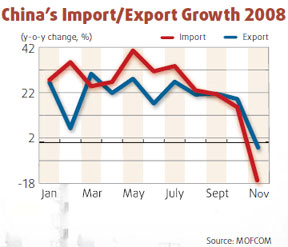The Asian Development Bank (ADB) notched down its forecast for China's annual economic growth next year to 8.2 percent from the previous forecast of 9.5 percent, saying the deepening global financial crisis has intensified its grip on Asian economies.
The country's GDP growth could reach 9.5 percent this year, down from 11.9 percent for last year, according to the bank's latest Asia Economic Monitor report.

China's economy has shown obvious signs of a slowdown since September, with its annualized GDP growth falling to 9 percent in the third quarter, compared with 10.4 percent for the first half of this year. The World Bank forecast that China could register a GDP growth of 7.5 percent next year, lower than the 7.6 percent in 1999, when China was still suffering fallout from the 1997 Asian financial crisis.
In contrast, the Chinese Academy of Social Sciences (CASS), the country's top think tank, forecast that growth could be 9.3 percent next year, down from an estimated 9.8 percent for this year, citing the forceful government measures to stimulate economic growth.
China revealed a 4 trillion yuan stimulus plan on Nov 9 before local government pledged to follow suit, bringing total stimulus funds to a possible high of 18 trillion yuan.
The nation's top leadership gathered for the three-day economic work conference this week to reach a consensus and look for ways to implement those investment plans.
Whether China can maintain a GDP growth of above 8 percent, which is often deemed as a line for judging the health of the current Chinese economy, hinges on the effect of the country's stimulus package. "The local governments are vital in the implementation of the nation's stimulus efforts," said Sun Lijian, economist with the Fudan University.
"If the local governments proved to be active in carrying out the central government platform, it is very possible for the Chinese economy to grow by more than 8 percent," he said.

China's financial sector has remained sound, which helps shore up confidence in the overall economy, although some downward adjustment is inevitable, said Dong Yuping, economist with the CASS' Institute of Finance and Banking. "It is very likely that China keeps an economic growth of more than 8 percent next year."
The ADB also forecast that annual economic growth in developing Asia will slow to 5.8 percent in 2009, down from a likely 6.9 percent this year and 9 percent in 2007, as the impact of the global financial crisis spreads to emerging markets.
Developing Asia includes eight Central Asian republics, nine nations in Southeast Asia, eight nations in South Asia, five economies in East Asia and the Pacific Island nations.
The 5.8 percent growth would be the lowest since 2001 when growth was 4.6 percent. In its September forecast, the bank said the 2009 growth would be 7.2 percent.
(China Daily December 12, 2008)